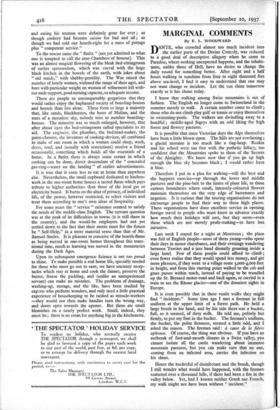MARGINAL COMMENTS
By E. L. WOODWARD
I) ANTE, who crowded almost too much incident into the earlier parts of the Divine Comedy, was reduced to a good deal of descriptive allegory when he came to Paradise, where nothing unexpected happens, and the inhabi- tants, unlike those of Hell, have no desire to change the daily round for something better. After eight and a half hours walking in sunshine from four to eight thousand feet above sea-level, I find it easy to understand that one may not want change or incident. Let the sun shine tomorrow exactly as it has shone today.
I know that walking among Swiss mountains is out of fashion. The English no longer come to Switzerland in the summer merely to walk. A certain number come to climb ; those who do not climb play golf or tennis or enjoy themselves in swimming-pools. The walkers are dwindling away to a handful ; middle-aged fogeys with an odd liking for high forest and flowery pastures.
It is possible that since Victorian days the Alps themselves have been a little blown upon. The hills are not everlasting ; a glacial moraine is too much like a slag-heap. Ruskin and his school were too free with the pathetic fallacy,' too confident that the Mountains spoke to them of the Secrets of the Almighty.. We know now that if you go up high enough the blue sky becomes black ; I would rather have it blue.
Therefore I put in a plea for walking—still the best and the happiest exercise—up through the lower and middle pastures and the pine-belt to the limits of plant life, to these curious boundaries where small, intensely-coloured flowers maintain themselves on the very edge of barrenness and negation. It is curious that the touring organisations do not encourage people to find their way to these high places. These organisations have done excellent service in opening foreign travel to people who must know in advance exactly how much their holidays will cost, but they seem—even those which are not merely profit-making—to have lost initiative.
Last week I stayed for a night at Montreux ; the place was full of English people—most of them young—who spent their days in motor charabancs, and their evenings wandering between Territet and a jazz band dismally groaning inside a large hotel. Few of these people could afford to climb ; even fewer realise that they would spend less money, and get more pleasure, if they went to a village some 3,000-4,000 feet in height, and from this starting point walked to the cols and grass passes within reach, instead of paying to be trundled up the St. Bernard motor-road and back again, or carried in a train to see the Rhone glacier—one of the dreariest sights in Europe.
It is even possible that in these sunlit walks they might find "incidents." Some time ago I met a fireman in full uniform at the upper limit of a forest path. He held a large brush in his hand, and by his side there was a bucket, full, so it seemed, of dirty milk. He told me, politely but firmly, to put my foot in the bucket. The fireman's uniform, the bucket, the polite firmness, seemed a little odd, and I asked the reason. The fireman said : a cause de la fievre aphteuse. Of course, the thing was obvious. If you have an outbreak of foot-and-mouth disease in a Swiss valley, you cannot isolate all the cattle wandering about immense mountain pastures, but you can make sure that no one, coming from an infected area, carries the infection on his shoes.
Hence the bucketful of disinfectant and the brush, though I still wonder what would have happened, with the firemen scattered over a thousand hills, if there had been a fire in the valley below. Yet, had I known neither Greek nor French, my walk might not have been without "incident."










































 Previous page
Previous page